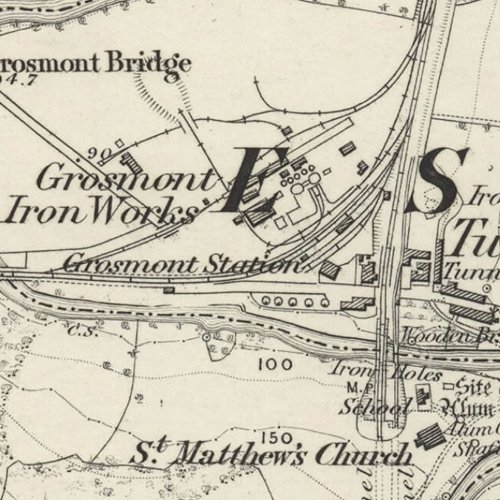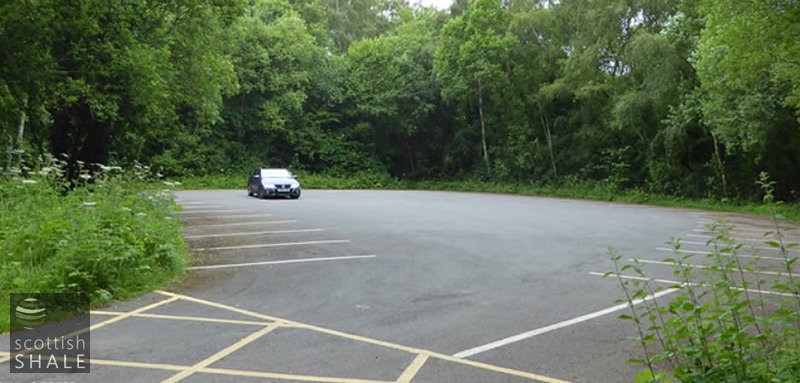Grosmont Oil Works

In October 1864, James George Beckton of Whitby patented a process for retorting oil-shales and coals using the waste heat from blast furnaces. Messrs. Bagnall established a small scale plant using Beckton's process at their Grosmont Iron Works. This was widely reported in the press and led to speculation that the Jurassic shales found in association with ironstone throughout the Cleveland district would become a valuable resource.
A report in early 1866 that "at Whitby the crude oil got by the Beckton process can be supplied in large quantities at £5 per ton", suggests that a reasonable quantity of oil was produced, but no evidence exists that manufacture continued following dramatic fall in oil prices later that year.
The former ironworks site was subject of an archaeological survey in 2007.
GROSMONT.
The New Iron Works.
The foundation stone of the first of the new blast furnaces, which the Grosmont Iron Company are about to erect, was laid, on Wednesday week, by T. Bagnall, Esq., one of the proprietors, in the presence of a numerous assemblage of spectators. A parchment roll, bearing an inception recording the names of the proprietors, the date, the manager's, cashier's, and contractor's names, were deposited beneath the foundation. The workmen dined together at the Tunnel Inn; whilst a select party were entertained at Grosmont Priory, Mr. Barnes, the manager. Considerable progress has been made, since our last notice, with other portions of the works. A number of cottages, built with bricks manufactured upon the estate, are in the course of erection; and the engine house is in progress. The working shaft, which is close by the Egton road, about 400 yards from the tunnel, is walled down to the alum shale, and the iron stone, which is about four feet thick, is bored a depth of 25 yards. An air shaft is being sunk on the opposite side of the river, and there can be no doubt, when the works are completed, they will add greatly to the prosperity of this district, the mineral wealth of which is almost incalculable.
Yorkshire Gazette, 14th June 1862
.......
Patents; James George Beckton. Whitby, York, improvements heating retorts and other ovens for the distillation of shale, coal, and other substances: Oct. 10, 1864
Aris's Birmingham Gazette, 25th March 1865
.......
Discovery of Oil the Cleveland Hills. —
In the Cleveland iron district large iron royalties have recently been leased several enterprising capitalists, including Mr. Geo. Elliott (of Houghton) Sir Charles Fox, Mr. Murray (contractor for the Portsmouth fortifications). Mr. H. K. Sparke, and others, who purpose erecting blast furnaces upon the ironstone, as, from calculations made by Mr. J. G. Beckton, engineer, Whitby, it is ascertained that pig iron can be produced at 3s. per ton cheaper this manner than by conveying ironstone to meet coke and coal.
A most important discovery has lately been patented by Mr. Beckton, which will render the Cleveland district still more celebrated. He proposes to extract oil, similar to the American petroleum, from the shales found above the ironstone. Some of these shales will yield 25 gallons of oil per ton, and the oil can produced at a cost not exceeding 6d. the gallon. Works are now erecting Grosmont to work this valuable patent in connection with the blast furnaces of Messrs. Bagnall.
The Newcastle Journal says we have just seen sample of the oil which has been extracted from the jet rock or shale which lies over the ironstone beds in the Cleveland district This is a most important discovery for Cleveland, owing to the fact that this shale is such abundance and, in many cases, crops out to the surface as may be seen on the coast north of Whitby, between Staithes and Runswick Bay, near the ironstone mines of Messrs. Palmer, which locality the jet rock or shale is very rich in oil, and can be worked at a mere nominal cost. This sample of oil we understand, was produced from the shale obtained at Grosmont, where Messrs. Bagnall, in connexion with their extensive ironworks, are preparing to produce this oil under the process patented Mr. Beckton, the eminent engineer, of Whitby.
Norfolk News, 18th November 1865
.......
It has recently been found that the shales of unctuous clay overlying the ironstone deposits of the Yorkshire Moors in the North Riding can be made to produce a mineral oil, similar to petroleum, at a cost of 6d. per gallon. From the fact that these shales crop out on the surface in almost all the valleys, the discovery is expected to impart a wonderful degree of life and activity to those hitherto unpeopled hills. This discovery coming quickly upon that of coal and ironstone, has risen the value of land amazingly. Last week a small property of 150 acres, for which being fit only for grouse shooting - £5 per acre was thought too much a few years ago, was sold for nearly £60 per acre, the enhanced price being paid simply because it is believed oil shale and ironstone lie below it. The process of producing the ore is patented by a Whitby gentleman, and preparations for working it are being added to the ironworks of Messrs.. Bagnall, at Grosmont.
Leeds Times, 2nd December 1865
.......
ENGLISH COAL PETROLEUM AS STEAM FUEL FOR THE NAVY.
(From Ryland's Iron Trade Circular.)
The following are Mr Richardson's (the successful patentee) remarks on this important subject:— "Our own English coal and shale oils are so excellent that they seem to have driven the American from our markets. The making these oils is destined to become one of the largest and most important manufactures in Great Britain; it is now only in its infancy. At present the first cost of making them is from £5 to £6 per ton; the price £10 and £13. At Whitby the crude oil got by the Beckton process can be supplied in large quantities at £5 per ton, the first cost being less than £4 to be still further reduced by their placing the retorts in such position as to use the waste heat from adjoining blast furnaces.
As steam fuel I find the common shale oil not so strong as the natural petroleum. It vaporises only ten pounds of water to one of oil, while the American vaporises from twelve to fourteen pounds. These oils as fuel are now well understood, and, by a very simple method, perfectly mastered.
Cardiff and Merthyr Guardian, 5th January 1866


